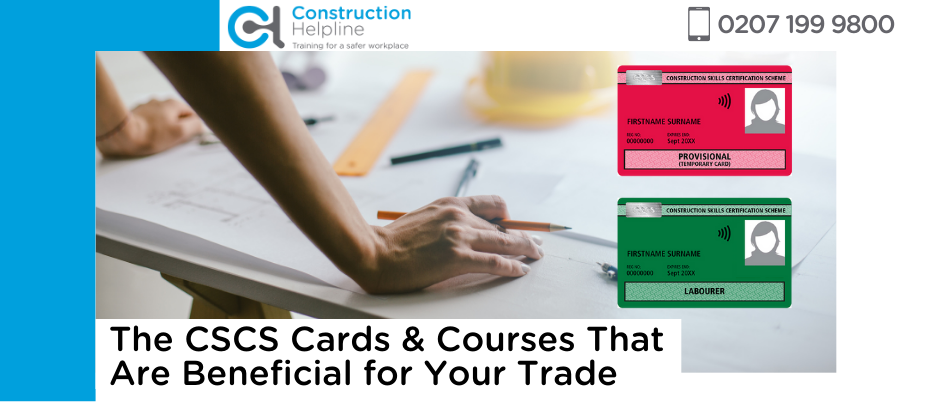The CSCS Cards and Courses That Are Beneficial for Your Trade
Trade occupations are arguably one of the most popular roles within construction, and with the demand for residential and commercial property continuing to rise, contractors are constantly looking for skilled tradespeople. Whether you are practical person or just interested in how things work, trades in construction that specialise in a particular field produce some of the most skilled individuals in the industry. If you are interested in learning a trade, the best resources come in the form of acquiring CSCS cards and/or taking a CSCS course.
What is the difference between a CSCS card and a CSCS course?
A CSCS (Construction Skills Certification Scheme) card is physical proof that you are rightly qualified and have the appropriate training to work safely on-site. Although they are not a legislative requirement, employers across the UK are making CSCS services mandatory for working on a construction site. There are over a dozen type of CSCS cards that reflect the different occupations and qualifications in construction, ranging from trainee to managerial roles.
Health & Safety is always a priority when working in construction, so it is essential that workers are aware of the safety regulations. CSCS courses are solely focused on health and safety on-site and are targeted towards potential and existing construction workers, including tradespeople. Both CSCS cards and CSCS courses are beneficial for a career in a trade.
Alternatively, another type of CSCS course is the construction NVQ course (National Vocational Qualification). This course is targeted to those who may have the skills to have a successful career in construction, but lack the qualifications needed to take the next step in their career.
Which CSCS service should I get for my desired trade?
Finding out which CSCS card/course is the right fit for your career choice can be quite daunting, however here are some suggestions on the best available resources that will benefit any Tradesperson:
Entry level – For most CSCS cards, it is likely that you will have to take a CSCS course. For example, with the popular CSCS green labourer card, workers are required to take a level 1 award in health & safety in construction environment 1 day course that is performed in the form of an in class examination. Construction Helpline also offers an online version of the course in the form of the online site safety course for labourers; this option has the convenience of being caried out at any time and day and is often the first qualification many construction workers receive. CSCS courses are valid for a lifetime, so you would only have to take the course once in helping build your successful career.
Carpentry & Joinery (Woodworking) – A career in woodworking is one of the most popular of the construction trades as the use of timber in British infrastructure is very common. The best course for acquiring qualifications in woodworking is the NVQ platinum course for Wood Occupations. During this course, you will work closely with a CHL assessor where you will be given tasks to provide evidence that you demonstrate the skills and knowledge to pass the NVQ. The assessment part of the course, depending on the individual, can be passed in 6 weeks. Upon completion, you will be given a CSCS Blue skilled worker card as well as certification that you are qualified to perform woodworking tasks on-site.
Bricklaying & Plastering – Trowel type trades are essential for the foundation of any construction project, therefore skilled bricklayers and plasterers are always sort after in the industry. Both trades require refined skills, whether this involves cutting bricks/blocks to size or making ornamental plasterwork that may require you to work at height. One of the best courses to take for a career in this field would be the NVQ platinum course for Trowel Occupations. Similar to the wood occupations course, you will work alongside an experienced assessor that will provide you with specific tasks to carry out in order to pass your NVQ. Furthermore, completion of the NVQ trowel occupations course will lead to you acquiring a CSCS Blue skilled worker card and becoming a fully qualified bricklayer or plasterer.
(It is valuable to note that the minimum age requirement for these qualifications is 16 and both NVQ platinum courses are valid for a lifetime.)
CITB Health & Safety Courses
Other than CSCS courses, there are other forms of Health & Safety testing available in the form of CITB tests. Although CSCS and CITB (Construction Industry Training Board) are separate organisations, it is often required for you to complete a CITB Health Safety & Environment test when applying for any CSCS card. Health & safety knowledge is vital when learning a specialised trade in order to keep yourself and your colleagues safe when working. As a result, it is recommended that aspiring tradespeople take a CITB course; below are some that are suitable for trades in construction:
- Heating and Plumbing – HS&E HVACR (Heating and Plumbing) Specialist Test
- Ductwork – HS&E HVACR (Ductwork) Specialist Test
- Pipefitting and Wielding – HS&E HVACR (Pipefitting & Welding) Specialist Test
- Plumbing or Gas Testing – HS&E Plumbing or Gas Specialist Test
- Refrigeration and Air Conditioning – HS&E HVACR (Refrigeration and Air Conditioning) Specialist Test
For a full list of all CITB tests available, click here
With 20% of tradespeople being over the age of 50, and 15% being over 60, construction trades in the UK could face a severe skills shortage in the next 10-15 years. There is no better time to pursue a career as a tradesperson in such an innovating and booming industry that is moving into a new phase focusing on sustainability and technology. Visit Construction Helpline where we offer a number of invaluable educational services including CSCS cards, CSCS courses and CITB tests that will help boost your budding career in your desired trade or call us on 0207 199 9800 today!


